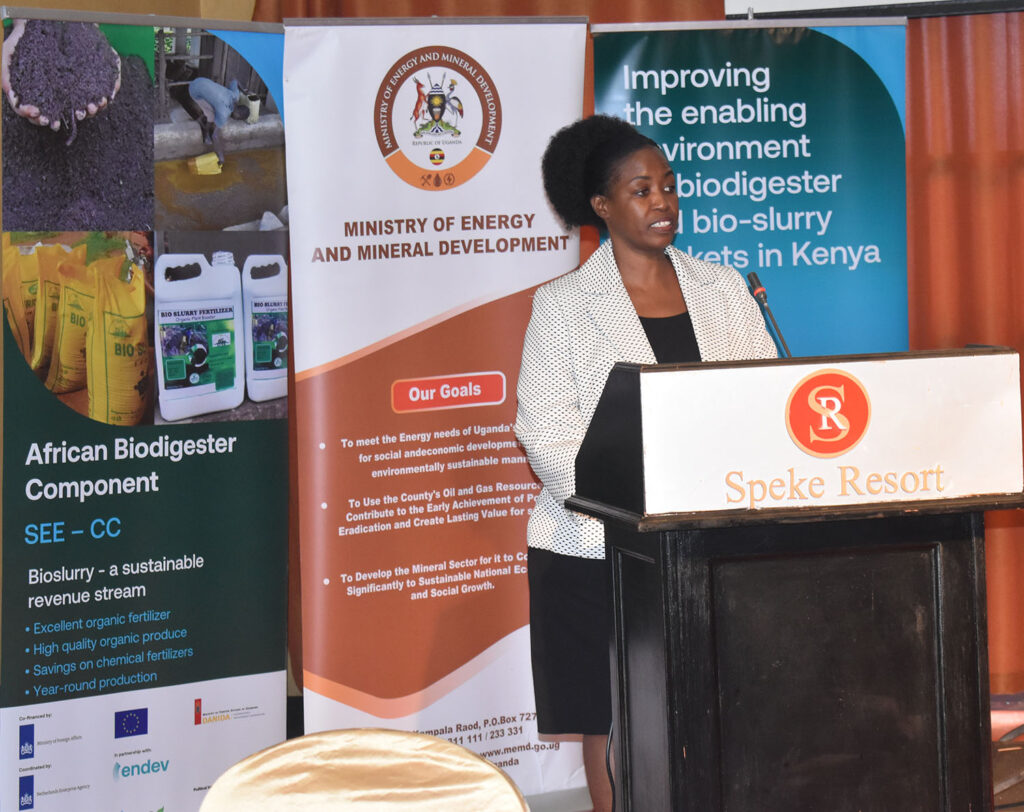By Sarah Nabakooza
Government representatives from Uganda, Kenya, Burkina Faso, Mali, and Niger gathered in Kampala last month for a groundbreaking event to promote bio digester technology in the sub-Saharan region.
The delegation signed declaration during the meeting which was the first annual knowledge exchange event of the African Bio Digester Component (ABC) project, a four-year initiative funded by the Netherlands Ministry of Foreign Affairs and implemented by SNV Uganda, GIZ, and Biogas Solutions Uganda Limited, with support from the Ministry of Energy and Mineral Development (MEMD) aimed at overcoming barriers and fostering sustainable bio digester markets.
The signed declaration reaffirmed the governments’ commitment to collaboration with development partners and the private sector in addressing critical barriers and supporting the growth and sustainability of commercial bio digester markets. The intention is to extend the impact of the ABC project beyond its lifetime.
The declaration also focuses on three key aspects: the demand-side, the supply-side, and creating an enabling environment. On the demand side, efforts will be made to develop the slurry extension, promote compost market development, enhance the quality of livestock production, and encourage organic fertilizer utilization. These efforts will be supported by the establishment of information management infrastructure and knowledge-sharing hubs within the sub-sector.
On the supply side, sustainable capacity building will be prioritized to address technical, financial, management, and use-case gaps. Business development services (BDS) and organizational capacity will receive support, along with the creation of a pipeline of investment-ready businesses and project ideas. Additionally, research and innovation ecosystems for bio digesters will be promoted, and National and Regional Technology Action Plans will be developed.
Creating an enabling environment will involve the implementation of regulations, standards, fiscal incentives, and policies to support the growth of bio digester technology.
The declaration acknowledged various challenges hindering the widespread adoption of bio digester markets, including high upfront costs, capacity gaps, inadequate standards, limited adherence to existing standards, limited coordination, and inadequate knowledge and awareness.
To overcome these challenges, the participating nations endorsed a call for addressing critical barriers through key interventions in financing, capacity building, policy and regulation, market development, technology, and infrastructure demonstration. Stakeholder coordination will play a vital role in implementing effective strategies. Access to finance and investment targeting different market players will be prioritized through innovative mechanisms and models, including regulated deployment of carbon financing and leveraging carbon markets.
Another important aspect of the initiative is reinforcing political will to create an enabling environment for the promotion of a market-based households and institutional bio digester sector. This will involve catalyzing strong, inclusive, and sustainable private sector participation by supporting networks and alliances at national and regional levels.
The ABC project holds significant promise for transforming the energy landscape in Africa. By promoting the adoption of bio digester technology, countries can mitigate the adverse environmental impacts of biomass energy consumption while simultaneously providing sustainable energy access. Additionally, the utilization of bio digesters can enhance organic fertilizer utilization, promoting agricultural sustainability and supporting the growth of the agricultural sector.

Over the course of the four-year project, the participating countries aim to collaborate, share knowledge and experiences, and implement strategic interventions to overcome barriers and promote the adoption of bio digester technology. Through concerted efforts and coordinated actions, the ABC project seeks to create sustainable bio digester markets that contribute to Africa’s energy transition and foster a greener and more prosperous future for the continent.
Peter Lokeris, the State Minister of Energy and Mineral Development, emphasized the challenge posed by Uganda’s heavy reliance on biomass, which accounts for 89.9% of the country’s primary energy supply. He stressed the need to support sustainable resource utilization as part of the energy transition agenda.
The knowledge exchange event intended to highlight critical barriers and opportunities in developing sustainable bio digester markets in Sub-Saharan Africa. Bio digester technology utilizes organic waste, including animal and human excreta, to produce biogas and fertilizer, providing clean and affordable cooking solutions in rural and urban areas.
The ABC project aims to construct and install 50,000 small-scale bio digesters by 2025, providing energy access to at least 250,000 people and reducing yearly carbon dioxide equivalent emissions by over 180,000 tons.
Phomolo Maphosa, the Country Director of SNV Netherlands Development Organization in Uganda, announced plans to contribute an additional 8,000 small-scale bio digester systems by 2026, building upon their previous success in implementing over 10,000 bio digesters in Uganda.
Julius Gitonga, the Deputy Director of Renewable Energy under the Ministry of Energy and Petroleum in Kenya, called for the development of bankable business proposals and financing mechanisms to advance the technology and conserve the environment. Gitonga noted that there are currently about 90 active companies in the bio digester industry in Kenya, emphasizing the need for increased outreach.
The importance and impact of the bio digester sub-sector were underlined during the event, with direct contributions to eight out of the 17 Sustainable Development Goals (SDGs). These contributions include poverty alleviation, sustainable agriculture, improved health and well-being, gender equality, increased access to clean energy, job creation, and enterprise development, as well as climate change mitigation and waste management.
As African governments unite to promote bio digester technology, they pave the way for sustainable energy solutions, agricultural development, and environmental conservation. The ABC project holds the potential to transform the energy landscape in Sub-Saharan Africa, promoting a greener and more prosperous future for the region.





